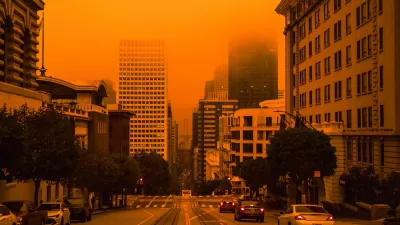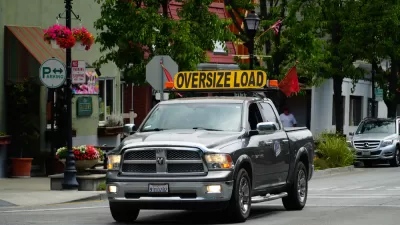AAA and the Chamber of Commerce fight environmentalists and transit planners who want to allow California voters to decide to add regional driver’s fees, either variable registration surcharges or new gas taxes, to fund climate protection measures.
"Legislation is working its way through the state Capitol that would allow cities (with voter approval) to levy higher car-registration fees and gas taxes."
The Assembly bill, which is now in the state Senate (and scheduled to be voted on 8/25), is meant to help reduce greenhouse-gas emissions" but also allow road maintenance projects.
"The bill...would allow regional transportation agencies to increase vehicle-license fees up to $90, depending on the fuel efficiency of the vehicle.
Agencies would also be allowed to propose a 3 percent increase to a gallon of gasoline."
"A majority of the revenues would go to "climate protection" programs such as public transportation and infrastructure to promote bicycling and walking. One-fourth of the revenue would go to maintaining and rehabilitating "local streets and roads, the state highway system, sidewalks or bicycle routes."
"Any increase proposal would have to go to the voters in a regular election, but because the increases are considered fees, a simple majority would be needed to pass an initiative rather than the two-thirds majority needed to pass a new tax.
That has organizations such as the Howard Jarvis Taxpayers Association and the California Chamber of Commerce steamed. With gas prices at record highs, the idea of asking for more at the pump seems like the wrong place to hit California drivers, some say."
FULL STORY: Cost of driving could climb higher

Alabama: Trump Terminates Settlements for Black Communities Harmed By Raw Sewage
Trump deemed the landmark civil rights agreement “illegal DEI and environmental justice policy.”

Planetizen Federal Action Tracker
A weekly monitor of how Trump’s orders and actions are impacting planners and planning in America.

The 120 Year Old Tiny Home Villages That Sheltered San Francisco’s Earthquake Refugees
More than a century ago, San Francisco mobilized to house thousands of residents displaced by the 1906 earthquake. Could their strategy offer a model for the present?

In Both Crashes and Crime, Public Transportation is Far Safer than Driving
Contrary to popular assumptions, public transportation has far lower crash and crime rates than automobile travel. For safer communities, improve and encourage transit travel.

Report: Zoning Reforms Should Complement Nashville’s Ambitious Transit Plan
Without reform, restrictive zoning codes will limit the impact of the city’s planned transit expansion and could exclude some of the residents who depend on transit the most.

Judge Orders Release of Frozen IRA, IIJA Funding
The decision is a victory for environmental groups who charged that freezing funds for critical infrastructure and disaster response programs caused “real and irreparable harm” to communities.
Urban Design for Planners 1: Software Tools
This six-course series explores essential urban design concepts using open source software and equips planners with the tools they need to participate fully in the urban design process.
Planning for Universal Design
Learn the tools for implementing Universal Design in planning regulations.
Clanton & Associates, Inc.
Jessamine County Fiscal Court
Institute for Housing and Urban Development Studies (IHS)
City of Grandview
Harvard GSD Executive Education
Toledo-Lucas County Plan Commissions
Salt Lake City
NYU Wagner Graduate School of Public Service





























